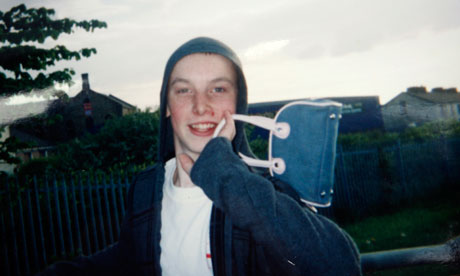
A second inquest into the death of a 14-year-old boy, the youngest person to die in custody in Britain in modern times, began today with a promise that restraint methods on young prisoners would be fully examined.
The unprecedented new hearing was ordered by the high court after a previous coroner refused to allow a jury to consider whether painful techniques used on Adam Rickwood were illegal.
The teenager was found hanging at Hassockfield secure training centre near Medomsley, County Durham, hours after four staff had carried him to his cell and one had struck him on the nose, allegedly to avoid a bite. The "distraction technique" has been ruled unlawful since the tragedy in 2004.
Adam's mother, Carol Pounder, told the inquest that regulations had also been broken by Adam's detention 150 miles from his home in Burnley, Lancashire – three times the maximum distance. She accused staff employed by Serco at the privately-run centre of videoing bad behaviour but switching cameras off "when they were giving the lads a hiding".
Pounder, who has been part of a long campaign to reform the youth penal system, told the jury at Easington, County Durham, that her son had been "no angel". But speaking directly to the panel of five women and four men, she said: "If you had assaulted any child like that, you would have appeared in court."
The inquest was opened by assistant deputy coroner Jeremy Freedman with the promise: "This will be a wide-ranging inquiry. You will hear about matters which do not impact immediately on the circumstances of Adam's death but because of the context of this death and the issues which it has raised, it is necessary for there to be a more extensive inquiry than would otherwise be the case."
He explained to the jury that the first inquest, also held at Easington, in 2007, had been ruled deficient by the high court because of meagre details about the punishment before Adam died. The hearing had not been told about his removal from association with other teenagers, the way he was manhandled, and the use of a sharp blow to the nose.
"It is agreed now by all the interested parties that what happened to Adam in the early evening of that night was both unlawful and illegal," said the coroner. Backed by the group Inquest, Pounder had obtained a judicial review and in January 2009 Mr Justice Baker quashed the original inquest verdict that Adam had taken his own life.
Today's hearing was told that the boy had refused to return to his cell as a punishment for bad behaviour, leading to the four staff using the "physical control in care" method of forcible removal. Two seized his arms, one lifted his legs and the fourth placed both hands on his head.
One of them, alarmed that the boy was going to bite him, then used the nose distraction technique. Adam was left in his cell where he was found later, hanged by his shoelaces.
Pounder said that she had been rung on the night of the incident by Adam's solicitor, who said that the boy had said he "had been in some kind of fight with staff and his nose was broken".
The jury heard that Adam was on remand charged with a wounding offence, and his mother had made the trip from Burnley to visit him twice a week. She said that she had asked him about the staff and he had told her that "some were sound and some were bastards".
The inquest, which resumes tomorrow, will hear evidence from the officers who restrained Adam, and Ellie Roy, former chief executive of the Youth Justice Board, which oversees the rules relating to children in custody. It is expected to last three weeks.

No hay comentarios:
Publicar un comentario